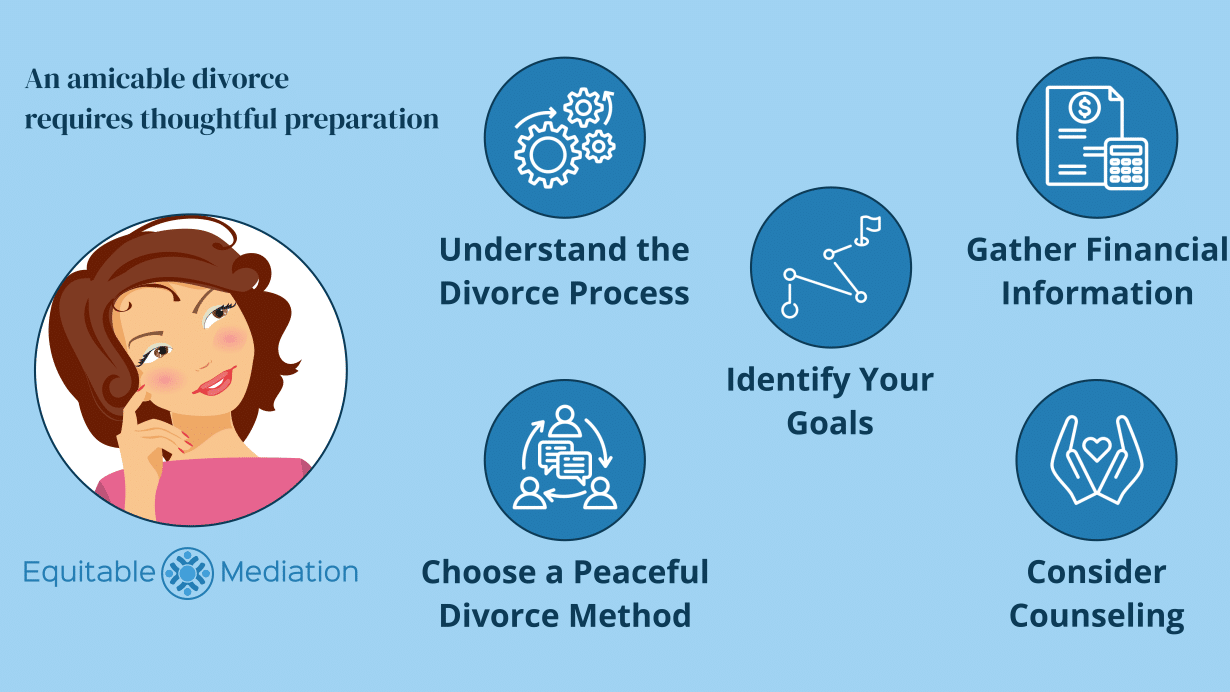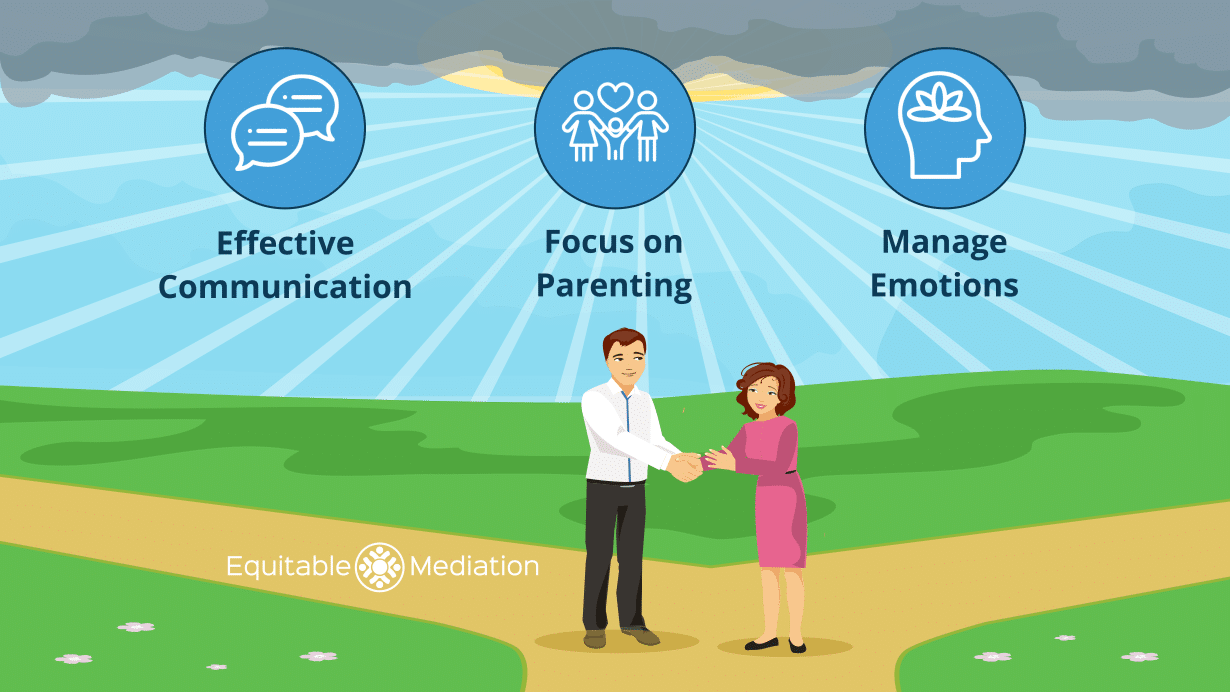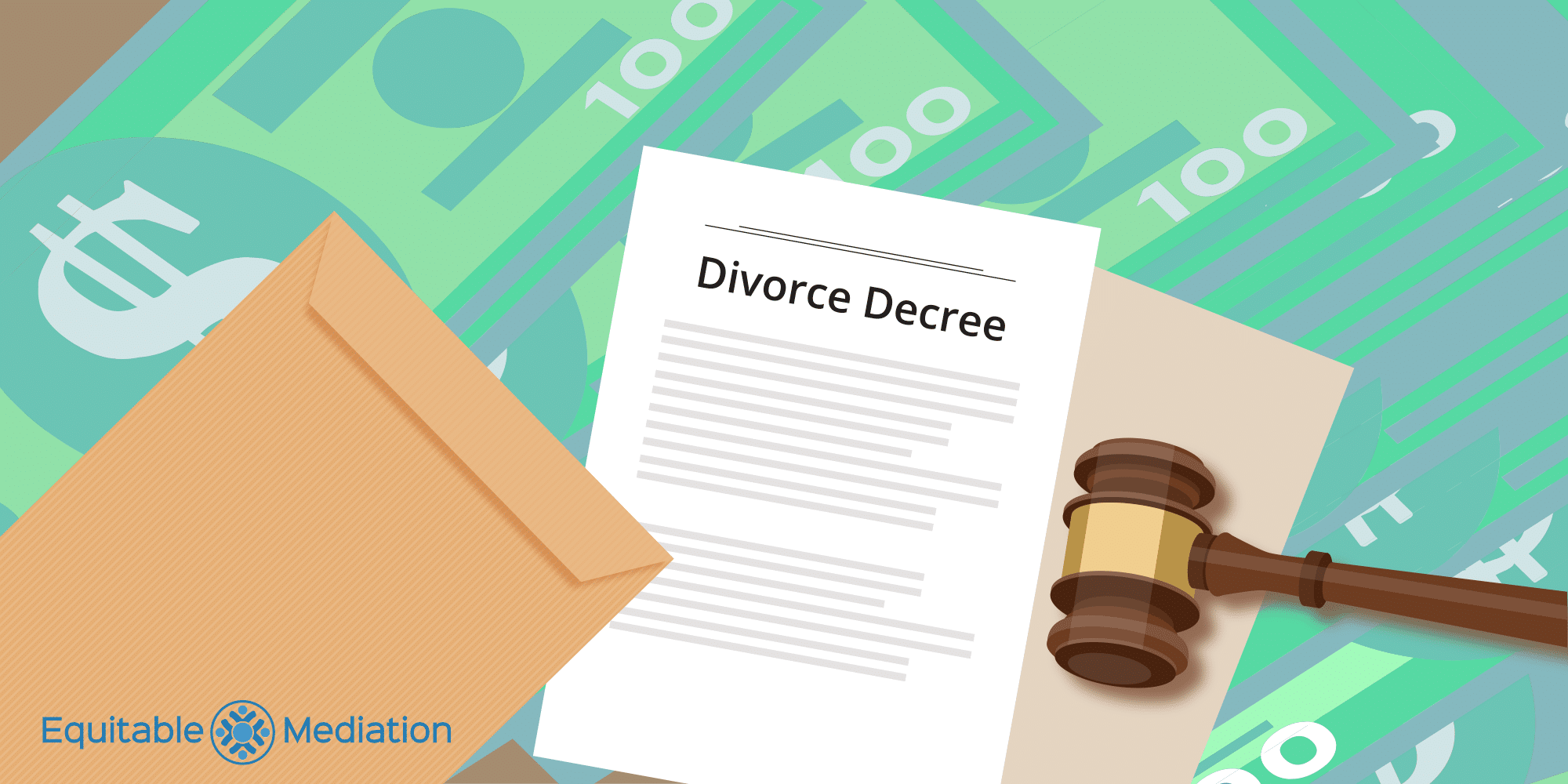Amicable divorce. It sounds like an oxymoron, doesn’t it? Like “jumbo shrimp” or “working vacation.” Two words that just don’t seem like they should go together. But as a mediator who has been helping couples end their marriage peacefully for nearly 20 years, I can tell you that despite the complex emotions involved, it’s not only possible to have an amicable divorce, but it’s preferable.
You might think that hiring a divorce attorney and “fighting for everything you’re entitled to” will make you feel better. But 2 to 3 years later, when your bank account is empty, your kids are failing miserably in school, and you haven’t slept through the night in who knows how long, and you’re still not divorced, you’re going to regret that decision.
Let’s take a look at what you can do to avoid turning your divorce proceedings into an all-out disaster.
What is an amicable divorce?
An amicable divorce is one in which both spouses agree to resolve the terms of their divorce agreement cooperatively and respectfully – out of court – with the help of a neutral, expert mediator.
When they do, they greatly increase their chances of a fair and equitable outcome, that puts their children’s needs first, resolves the issues of their divorce in months rather years, and saves them tens of thousands of dollars.
Allowing them to more quickly move forward, begin to heal, and spend their time being great co-parents. Instead of being stuck in an endless loop of visits to their lawyers office, or a court house, while the emotional and financial devastation piles up on them and their families.
5 Choices to make for an amicable split

When I look back at the couples whose divorces were the most peaceful, cost-effective, and efficient – and where both spouses felt their agreement was fair to each of them and their kids – I found they all had 5 things in common.
They made the decision to divorce without blame.
Regardless of the factors that led to the failure of your marriage, if you find yourself at the crossroads of divorce, the time for blame has passed. Your only choice now is to move forward.
If you choose to make the decision to divorce without placing blame on each other, and instead work on resolving the issues required to help you move forward, you stand an excellent chance of divorcing amicably.
Choose to rehash the past and blame each other for what went wrong during the marriage and your chances of having an amicable divorce go out the window.
They focused on the big picture
Before you get wrapped up making sure you get “every last thing – and then some,” take the time to figure out what’s really most important to you – what your wants, needs, and non-negotiables are. That way, you won’t get caught up in the muck and will have the clarity to tackle negotiations in a more peaceful and constructive manner.
When you focus on what’s most important, like your kids and your future, instead of fighting over small things like who gets the toaster, you’ll improve your chances of divorcing amicably and getting an agreement you find fair and equitable.
They negotiated the terms of their divorce in good faith
In a good faith negotiation, you and your spouse agree to put “all your cards on the table.” Openly disclosing all assets, debts, income, etc. in order to paint a complete picture of your finances, and the issues that need to be discussed and resolved.
It’s quite common for divorcing spouses to already not trust each other. So if you or your spouse were to knowingly withhold important information during your negotiations, only to have it discovered at a future point in time, any trust that was left between you will evaporate, and your divorce will take an ugly turn.
A good faith negotiation builds trust. When you and your soon to be ex commit to full disclosure, you not only level the playing field, but create an environment of mutual respect.
And it’s this respect that becomes a valuable tool in reaching a fair agreement that you can both feel good about.
They placed the needs of their children first
If you’re a parent, you know just how important it is to put the needs of your kids first. But once your divorce gets underway, the hurt and anger between you and your spouse, can sometimes cloud your judgement. In order to have an amicable divorce, you can’t let your feelings towards “the other parent” get in the way of negotiating a parenting plan and child support agreement that’s in the best interests of your kids.
Mediation is the most child-focused of all the divorce options. Allowing you to make the decisions throughout your divorce or separation that are in your children’s best interests. How is that?
When as a couple, you and your spouse choose to work with a divorce mediator you’re saying:
“We’re putting our children’s needs first. We want to decide together what’s best for them as parents. Not against each other as litigants.”
“We want to make sure to design a parenting plan that has each of us as actively involved in their lives and has as much parenting time with them as possible.”
“We want to work together to resolve child support and make sure they don’t become the economic victims of our divorce.”
They worked through the terms of their divorce settlement in an environment of mutual respect and dignity – out of court – using divorce mediation
The best way to have an amicable separation or divorce is to choose to mediate without involving lawyers. By its very nature, divorce can get heated. So don’t hire family law attorneys and turn your divorce into an all-out war in court.
Instead, work with one highly skilled divorce mediator who will help you develop peaceful divorce solutions that benefit both of you and your children.
Unlike contentious divorce litigation or even a collaborative divorce process, there is no confrontational “us versus them” mentality. Divorce mediation is based on respectful dialog and mutually-agreeable problem-solving so you can both move forward peacefully instead of prolonging the fighting. Which, if you’ll be spending time as co-parents, will be especially important to do.
Not divorcing amicably will really cost you in legal fees!

If you’re considering hiring a divorce lawyer remember, costs can be substantial. Opting for a civil divorce might seem less dramatic, but it’s worth it. Divorce lawyers are costly. Expenses can quickly escalate to tens or hundreds of thousands of dollars, potentially forcing you to liquidate savings, take out loans, or use money from your children’s college funds.
Beyond the financial burden, a lawyer-driven divorce can take an emotional toll, leading to prolonged conflict and stress for many couples.
A peaceful divorce is more economical. Choosing a peaceful path forward can save you both money and emotional distress.
Preparing for an amicable divorce

Preparing for an amicable divorce requires a thoughtful and intentional approach. It doesn’t just happen. Here are 5 things you can do to help you prepare.
Gather financial information
Having a clear picture of your financial situation will make the process smoother and help you and your spouse in negotiating a fair settlement. We have a saying here that goes “do the discovery before the deciding.” Information is power, and there’s no better decision, than an informed decision.
Understand the divorce process
Consider taking a planning for divorce course. Knowing how divorce works will help you navigate the process more confidently and understand the issues you need to be thinking about now and in the future.
Consider counseling or coaching
Professional help from a counselor, therapist, or divorce coach, can be incredibly beneficial. It can help you process your emotions, develop a plan for moving forward, and ensure that you’re making decisions from a place of clarity and strength.
Identify your goals
Take some time to determine what you want to achieve in the divorce process. This includes your goals for child custody, financial support, and property division. Having clear objectives will guide your negotiations and help you stay focused on what’s most important.
Choose a peaceful divorce method
As you’ve been learning, the decision to have an amicable divorce is a choice. Choosing to pursue an uncontested divorce using an alternative dispute resolution method like mediation, can help you reach an agreement with less arguing and stress.
5 Negotiation tips for an amicable divorce process

Certainly learning about, and choosing to have, an amicable divorce are great first steps. But once things get underway, effective communication and skilled negotiation, will play a significant role in determining whether or not you’ll have an amicable divorce.
When couples don’t listen to each other, spend time blaming each other, or defending their (possibly unrealistic) positions, that’s when things can go off track. Here are 5 tips to help you communicate effectively and negotiate a fair settlement once you enter the divorce process.
Practice active listening
I know it may be difficult, and it may be the first time in years that you’ve actually done so, but listen carefully to your soon-to-be-ex spouse’s concerns and respond thoughtfully. Active listening shows respect and can help de-escalate tensions, making it easier to find common ground. You’d be surprised at how many of my clients are on the same page, but they just don’t realize it because they’re so busy waiting for their turn to speak.
Use “I” statements
Instead of blaming your soon to be former spouse, use “I” statements to express your feelings and needs. For example, say “I feel concerned about our children’s schedule” instead of “You never stick to the schedule!” The former opens the conversation up to problem-solving, whereas the latter will only result in your spouse trying to defend themselves.
Focus on interests, not positions
Instead of focusing on your respective positions, try to understand the underlying interests and needs that are driving each of your requests. This is what we refer to as “interest-based negotiations” and it’s a valuable skill that you should take time to learn. Your spouse, most likely, isn’t being intentionally difficult, so learn to look behind their position to open up avenues of possible agreement.
Seek common ground
You and your spouse have probably been disagreeing for years, so looking for common ground may not come easy. But by trying to find solutions that benefit both parties, not only can it lead to a more amicable and sustainable agreement, but you actually may walk away with even more than you thought possible. This is what we mediators call “expanding the pie.”
Negotiate your agreement using divorce mediation
A neutral mediator can facilitate difficult discussions between you and your spouse, help you understand each other’s perspectives, and guide you toward a mutually acceptable agreement.
Key takeaways for an amicable divorce

- Remember that every divorce begins with a choice. By deciding to divorce amicably, you’re choosing a path that protects both your bank account and your children’s well-being – instead of spending years in court depleting your savings and emotional reserves.
- Let go of the blame game – it’s one of the most powerful decisions you can make. While the factors leading to your divorce may be complex, moving forward without pointing fingers gives you the best chance at a peaceful resolution and a healthier future.
- Think of good faith negotiation as laying your cards on the table. When both you and your spouse commit to full financial disclosure and honest communication, you create an environment of trust that makes reaching a fair agreement so much more achievable.
- Consider mediation your path to peace. Working with a skilled mediator instead of opposing attorneys helps you and your spouse focus on solutions rather than conflict, leading to agreements that truly work for both of you and your children.
- Practice the art of listening – really listening – to your spouse during negotiations. Using “I feel” statements instead of accusations can, with the guidance of an experienced mediator, transform tense conversations into productive discussions where both of you feel heard and understood.
- Set yourself up for success by doing your homework. Gathering financial information, understanding the divorce process, and getting emotional support aren’t just practical steps – they’re investments in a smoother, more peaceful journey.
- Think of your divorce approach as writing the first chapter of your co-parenting story. The tone you set now will influence your family dynamics for years to come, so choosing an amicable path creates a foundation for positive future relationships.






